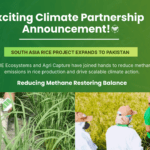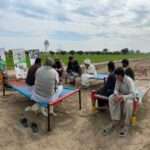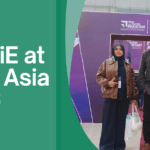News
World Cotton Day: SAWIE’s Vision for Sustainable, Climate-Smart Cotton in Pakistan
On October 7, 2024, SAWIE celebrated World Cotton Day by hosting the online “Sustainable Cotton Conference Pakistan 2024.” The theme of the conference was centered on climate resilience, sustainability, and technology integration, with the event divided into four comprehensive sessions. The conference was live-streamed on Facebook via Zoom and witnessed active participation from farmers, students, experts, industry leaders, and stakeholders across the cotton value chain.

Top News
In the Introductory Session, Dr. Khalid Mahmood welcomed the participants, followed by a recitation from the Holy Quran by Haji Muhammad. A video showcasing SAWIE’s sustainable cotton initiatives and traceability services was then played, highlighting their ongoing work in Baluchistan and Punjab, where organic cotton trials are being conducted, supported by SAWIE’s expert advisory team. Mike McCue, Director of Communications at the International Cotton Advisory Committee (ICAC), shared a recorded message, praising the resilience of Pakistani farmers during the COVID-19 era and acknowledging their critical role in maintaining cotton supply to global markets. This was followed by insights from Professor Gokhan Ozertan from Bogazici University, Turkey, who emphasized the importance of adapting smart technology, resource efficiency, and sustainable practices to achieve optimal cotton yields.
The second session, Sustainable Cotton Policy, saw Dr. Tassawar Malik, Director of Research at the Pakistan Central Cotton Committee (PCCC), acknowledging the importance of the conference in bringing together key stakeholders. He underscored cotton’s potential to contribute $8-9 billion in export revenue for Pakistan if managed effectively. He also discussed ongoing research at PCCC aimed at improving cotton production. Babar Bajwa, Senior Regional Director of CABI, highlighted the need for sustainability and traceability solutions to meet international market demands. He proposed creating waste-sorting hubs for textile reuse and recycling, implementing an Extended Producer Responsibility (EPR) protocol, and ensuring better labor rights as per ILO recommendations.
Syed Habib Ullah Shah, Director of the Agriculture Extension Department in Baluchistan, highlighted the cultivation of 100,000 acres of organic cotton in the province, which has been receiving premium prices. He also announced the upcoming approval of Baluchistan’s first sustainable cotton policy. Iqra Inam, Head of Sustainability at Sapphire, emphasized the role of technology in achieving sustainability, noting Sapphire’s collaboration with SAWIE on farm digitalization and mapping. Asif Inam, Vice President of the Federation of Pakistan Chamber of Commerce and Industry (FPCCI), expressed his pleasure at the gathering of stakeholders and congratulated SAWIE for their efforts in uniting industry leaders.
Prof. Asif Ali, Chairperson of the National Seed Development and Registration Authority (NSDRA), advocated for transgenic crops and zoning cotton-producing areas to bolster climate resilience.
The third session, Challenges and Future Opportunities in Sustainable Cotton, featured Dr. Shafiq Ahmed, Senior Advisor at the Better Cotton Initiative (BCI), who discussed the need for quality-based cotton exports and the crucial role of ginners in ensuring sustainability and traceability, which is increasingly demanded by international markets. Saqib Sohail, Lead Projects at Artistic Milliners, outlined the various challenges facing Pakistan’s cotton sector, including pest infestations, low prices, and declining quality, while emphasizing the importance of carbon credits in promoting sustainability. Franco Constantini, CEO of Regenagri-UK, shared insights on sustainable practices across 4,000 hectares in the UK and explained the certification process for organic production.
Catherine Bottrill, CEO of Pilio, discussed how reducing production costs is vital for achieving sustainability. Hammad Naqi Khan, CEO of WWF Pakistan, addressed the challenges posed by climate change and emphasized the need for microfinance solutions to empower farmers, particularly in navigating logistical hurdles. Dr. Javed Hassan, Senior Advisor at the All-Pakistan Textile Mills Association (APTMA), stressed the importance of enhancing fiber staple length, investing in breeding programs, and developing competitive varieties to increase export revenue.
The final session, Farmer-Centered Innovation and Research, opened with Prof. Abdul Wakeel, Associate Professor at the University of Agriculture Faisalabad, who discussed the role of potassium in cotton production, particularly in improving stress tolerance and reducing greenhouse gas emissions. Asif Mehmood, an organic cotton expert, emphasized the importance of collaboration, data sharing, and supply chain integration to support farmers and promote climate-smart agriculture. He also called for the establishment of a national-level forum focused on sustainable fiber. Prof. Wajid Nasim Jatoi, Director of the International Center for Climate Change and Food Security at Islamia University Bahawalpur, shared the consortium’s efforts in climate-smart agriculture, highlighting SAWIE’s partnership in promoting sustainable practices. Prof. Bushra Rashid from Punjab University advocated for the increased use of robotics, mechanization, and biotech labs in cotton farming. Dr. Shahid Mansoor from the National Institute of Agriculture and Biology (NIAB) underscored the importance of indigenous, non-GMO cotton varieties and shared the success of distributing 60 purified varieties to farmers for local production.
Following the conclusion of these sessions, participants had the opportunity to engage in a Q&A segment. The event ended with a vote of thanks from Dr. Khalid Mahmood, who expressed gratitude to all speakers, participants, and the SAWIE team for making the conference a success. SAWIE also marked World Cotton Day with a celebration at its regional office in Karor Lal Esan, Layyah, where a cake-cutting ceremony was held. This event reflected our continued commitment to supporting sustainable cotton initiatives at the grassroots level. SAWIE extends its heartfelt gratitude to all our collaborators, partners, participants, and esteemed speakers for their invaluable contributions to the Sustainable Cotton Conference Pakistan 2024. Your support and participation have been instrumental in making this event a success, fostering dialogue, and advancing our collective efforts toward sustainable cotton practices. We look forward to continuing our work together for a more resilient and sustainable future.
SAWIE extends its heartfelt gratitude to all our collaborators, partners, participants, and esteemed speakers for their invaluable contributions to the Sustainable Cotton Conference Pakistan 2024. Your support and participation have been instrumental in making this event a success, fostering dialogue, and advancing our collective efforts toward sustainable cotton practices. We look forward to continuing our work together for a more resilient and sustainable future.








